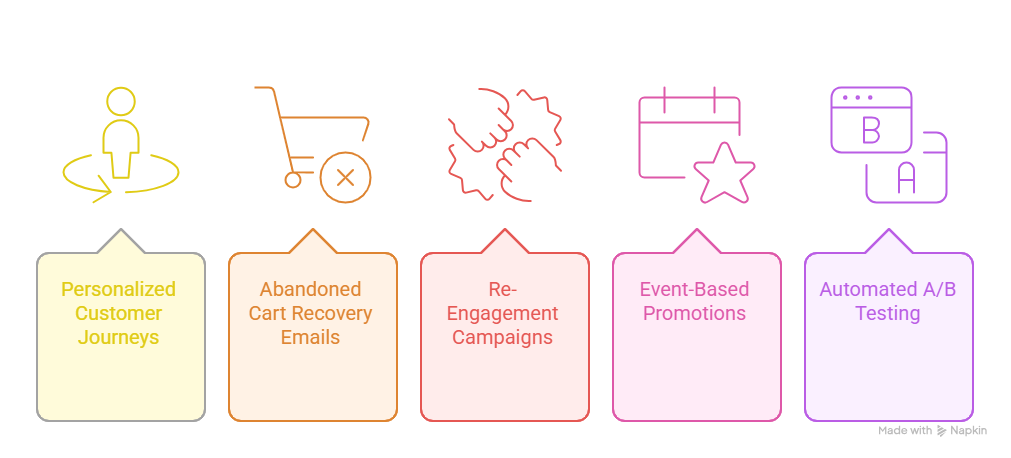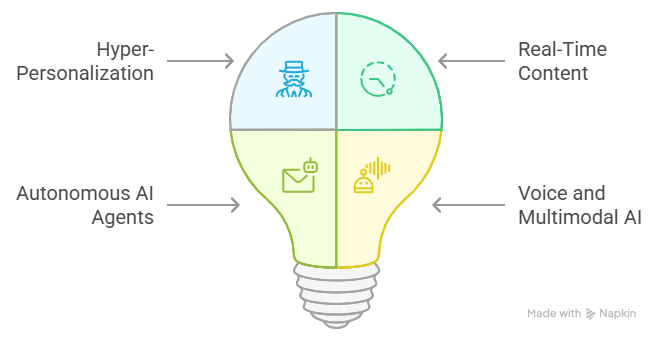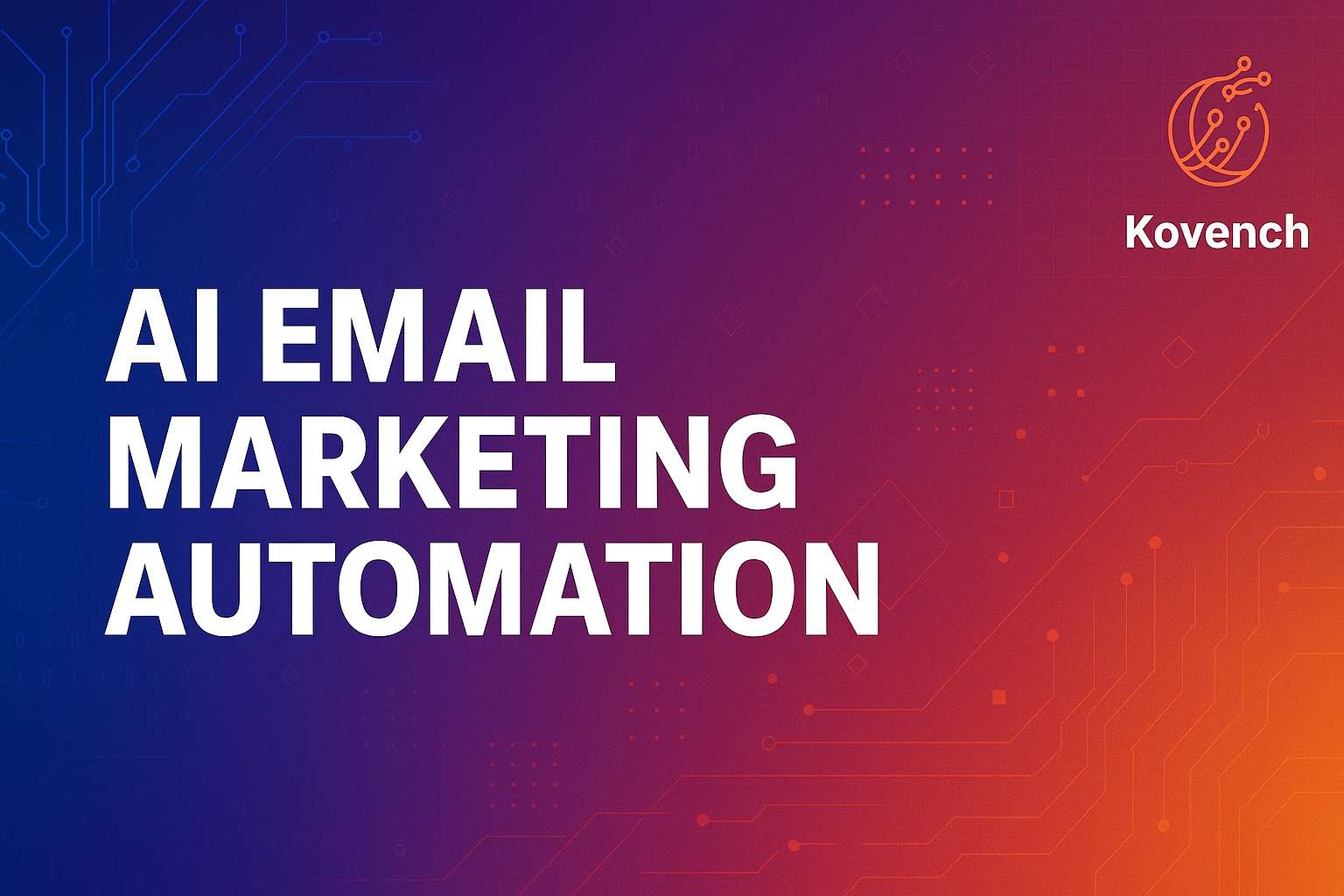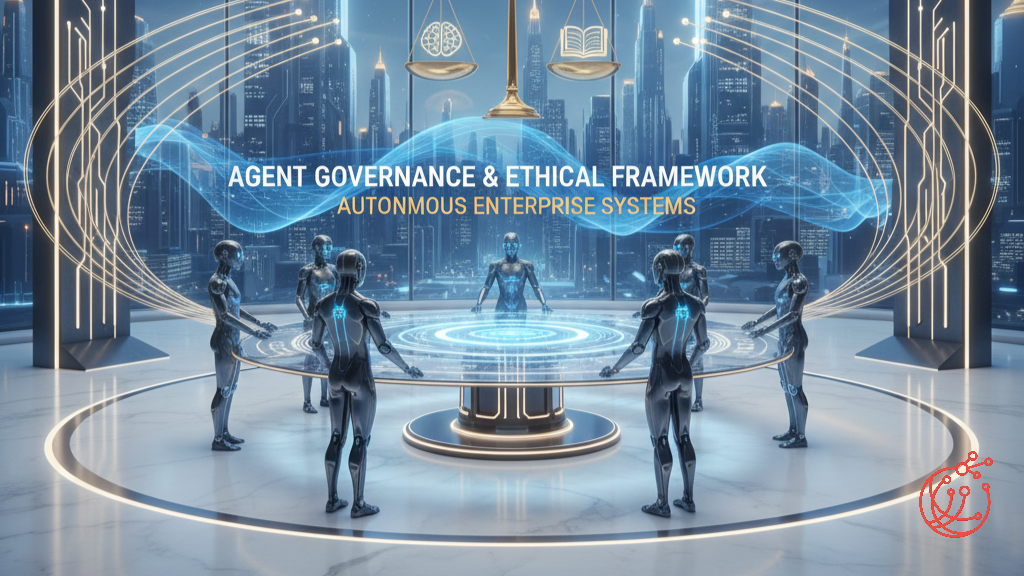Table Of Contents
1. Introduction
AI-driven email marketing automation is transforming how businesses engage customers by delivering personalized, timely, and relevant messages at scale. This technology leverages advanced AI tools to optimize campaign performance, enhance customer segmentation, and automate content creation. According to a McKinsey study, personalization can deliver 5–8 times the ROI on marketing spend and lift sales by 10% or more (McKinsey). Similarly, Statista reports that nearly 87% of marketers plan to invest in AI for email personalization by 2025 (Statista).
In this article, we explore key AI technologies, practical use cases, and effective strategies for implementing AI in email marketing, empowering marketers to boost engagement and ROI while streamlining workflows. At Kovench, we specialize in helping businesses harness these AI capabilities to achieve their marketing goals efficiently and effectively.
1.1 What is AI Email Marketing Automation?
AI Email Marketing Automation uses advanced technologies like machine learning, natural language processing (NLP), and predictive analytics to automate, optimize, and personalize email campaigns.
It enables marketers to:
- Send hyper-personalized emails tailored to individual behaviors and preferences
- Optimize send times based on predictive models
- Automate workflows such as follow-ups, re-engagement, and segmentation
For example, Salesforce found that AI-driven personalization can increase customer engagement by 41% (Salesforce Research). This approach transforms email marketing from a manual task into a strategic, data-driven process that improves engagement, open rates, and conversions.
1.2 Importance of AI in Modern Email Marketing
AI is crucial in modern email marketing because it enables hyper-personalization, real-time optimization, and data-driven decision-making.
- Higher engagement: AI-powered tools analyze vast customer data to tailor content, predict behavior, and automate tasks, leading to open rates above 40% in highly targeted campaigns (Campaign Monitor).
- Improved conversions: According to PwC, AI adoption in marketing can increase conversions by up to 82% (PwC Report).
- Efficiency gains: Automation frees marketers to focus on creative strategy while AI handles repetitive tasks like send-time optimization, subject line testing, and segmentation.
As consumer expectations rise, AI-driven email marketing automation is no longer optional but essential for competitive advantage and sustained growth in 2025.
1.3 Scope of the Article
This article explores the scope of AI-driven email marketing automation by covering:
- Key technologies (machine learning, NLP, predictive analytics, generative AI)
- Practical use cases (personalization, abandoned cart recovery, re-engagement)
- Implementation strategies (platform selection, integration, compliance, ROI tracking)
It is designed for marketing professionals and business owners seeking actionable insights to enhance email campaign performance using AI. To maintain focus, it excludes unrelated digital marketing channels or non-AI automation techniques.
2. Key Technologies in AI Email Marketing Automation
2.1 Machine Learning for Predictive Insights
Machine learning (ML) is central to AI-driven email marketing automation by enabling predictive insights through analyzing historical data to forecast customer behavior and campaign outcomes. ML models, such as random forests and gradient boosting, learn patterns from past interactions to predict metrics like open rates, click-through rates, and customer churn. This capability allows marketers to tailor content and timing for maximum engagement.
These models improve over time with new data, enhancing accuracy in dynamic marketing environments. Implementing ML for predictive insights helps businesses anticipate customer needs, optimize segmentation, and increase campaign ROI effectively. At Kovench, we leverage these advanced ML techniques to empower our clients, ensuring they achieve greater returns on their marketing investments through data-driven decision-making and targeted strategies.
2.1.1 Predictive Send Times
Predictive Send Times utilize AI-driven email marketing automation and machine learning to analyze historical email engagement data—such as open and click times—to identify when each recipient is most likely to interact with emails. This capability allows marketers to schedule sends at personalized optimal moments, significantly boosting open rates and engagement. The system continuously learns from new data, adapting to changing behaviors and time zones for precise timing. By implementing predictive sending strategies, Kovench helps clients enhance their marketing campaigns, removing guesswork and improving campaign effectiveness through data-driven timing.
2.1.2 Customer Behavior Forecasting
Customer behavior forecasting in AI-driven email marketing automation employs machine learning models to analyze historical customer data and predict future actions such as purchase likelihood, churn risk, and engagement patterns. Techniques like regression analysis, decision trees, and neural networks identify trends and segment customers for targeted campaigns. This enables personalized messaging, optimized send times, and proactive retention strategies, ultimately improving conversion rates and customer loyalty. Kovench's expertise in refining these models with new data enhances prediction accuracy, supporting dynamic marketing strategies that adapt to evolving customer preferences and market conditions.
2.2 Natural Language Processing (NLP) for Content Personalization
Natural Language Processing (NLP) powers content personalization by analyzing user data—such as browsing history, past interactions, and demographics—to dynamically tailor email content. Techniques like text analysis, sentiment detection, and entity recognition enable AI to generate personalized subject lines, product recommendations, and message bodies that resonate with individual preferences. Transformer-based models (e.g., BERT, GPT) fine-tuned on specific domains enhance context-aware content creation, improving engagement and conversion rates. Kovench leverages NLP-driven personalization to continuously adapt by learning from user behavior, ensuring relevance while addressing privacy and data quality challenges crucial for effective AI email marketing automation.
2.2.1 Subject Line Optimization
AI-driven subject line optimization enhances email open rates by using machine learning to analyze past performance and predict the most effective wording, length, and structure. Best practices include keeping subject lines concise (under 42 characters or 5–7 words), clear, and relevant to quickly convey value. AI tools generate multiple personalized variations rapidly, enabling data-driven A/B testing to identify high-performing lines that create curiosity, urgency, or personalization. This approach improves engagement by adapting to audience preferences and device constraints, ultimately boosting campaign ROI with less manual effort. Consistent retraining of AI models ensures ongoing optimization aligned with evolving trends, allowing Kovench to help clients achieve greater efficiency in their marketing efforts.
2.2.2 Tone and Language Adaptation
Tone and language adaptation in AI-driven email marketing automation involves tailoring the style, formality, and vocabulary of emails to match the preferences, values, and expectations of different audience segments. This ensures messages resonate effectively, enhancing engagement and conversion rates. AI analyzes recipient data to adjust tone—whether formal, conversational, or playful—aligning with brand identity and audience demographics. Such adaptation improves personalization by reflecting the recipient’s cultural context, emotional state, or previous interactions, making communications more relevant and impactful. Consistent tone guidelines help maintain brand voice while allowing flexibility for diverse customer profiles, ultimately leading to improved customer relationships and increased ROI for Kovench's clients.
2.3 Predictive Analytics for Campaign Optimization
Predictive analytics in AI-driven email marketing automation leverages historical data and machine learning algorithms to forecast future campaign performance. By analyzing patterns in customer behavior, AI can identify which segments are most likely to engage with specific content, allowing marketers to tailor their strategies accordingly. Key benefits include:
- Enhanced targeting: AI can segment audiences based on predicted behaviors, ensuring that the right message reaches the right person at the right time.
- Optimized send times: By analyzing when recipients are most likely to open emails, AI can recommend optimal send times, increasing open rates.
- Content recommendations: AI can suggest content that resonates with specific audience segments, improving relevance and engagement.
Implementing predictive analytics requires a robust data infrastructure and ongoing model training to adapt to changing consumer behaviors and preferences. By utilizing these insights, Kovench empowers businesses to significantly enhance their email marketing effectiveness and drive higher conversion rates, ultimately achieving greater ROI.
2.3.1 Data-Driven Segmentation
Data-driven segmentation utilizes AI to categorize customers into distinct groups based on shared behaviors, demographics, and interactions, facilitating highly personalized email marketing. By analyzing comprehensive data—such as purchase history, website activity, and engagement metrics—AI algorithms cluster customers to tailor messaging, optimize timing, and improve relevance. This approach enhances targeting precision, boosts engagement, and increases ROI by delivering content that resonates with each segment’s unique needs and preferences. Effective data-driven segmentation requires clean, unified data sources and clear business goals to guide AI models in creating actionable customer groups for automated, dynamic email campaigns. At Kovench, we assist clients in implementing robust data-driven segmentation strategies that lead to measurable improvements in customer engagement and overall marketing effectiveness.
2.3.2 Customer Lifetime Value Prediction
Customer Lifetime Value (CLV) prediction estimates the total future revenue a customer will generate over their entire relationship with a business. It employs historical purchase data, customer behavior, and advanced analytics—often utilizing machine learning models like RFM (Recency, Frequency, Monetary) and probabilistic approaches—to forecast buying patterns and retention likelihood. This forward-looking metric helps marketers identify high-value customers, optimize acquisition costs, and tailor retention strategies, enabling more precise targeting and sustainable growth. Predictive CLV is more complex than historic CLV but offers deeper insights for strategic decision-making in AI-driven email marketing automation. Kovench's expertise in CLV prediction empowers clients to make informed decisions that enhance customer relationships and drive profitability.
2.4 Generative AI for Automated Content Creation
Generative AI is revolutionizing content creation by automating the generation of personalized email content. This technology leverages natural language processing (NLP) and machine learning to create tailored messages that resonate with individual recipients.
Key benefits of generative AI for automated content creation include:
- Personalization at Scale: Generative AI can produce unique content for each recipient based on their preferences and behaviors, ensuring that emails are relevant and engaging.
- Efficiency: Automating content creation reduces the time and resources needed for manual writing, allowing marketing teams to focus on strategy and analysis.
- A/B Testing Optimization: AI can generate multiple variations of email content, enabling marketers to test different approaches and identify the most effective messaging strategies.
- Dynamic Content Updates: Generative AI can adapt content in real-time based on user interactions, ensuring that emails remain relevant even after they are sent.
By integrating generative AI into email marketing strategies, businesses can enhance their communication efforts, improve customer engagement, and drive better results from their campaigns. Kovench's solutions in generative AI enable clients to streamline their content creation processes, ultimately leading to higher engagement rates and improved ROI.
3. Use Cases of AI Email Marketing Automation
AI email marketing automation is widely used for personalization at scale, dynamic product recommendations, and send-time optimization to boost engagement and conversions. It enables tailored content based on user behavior, such as personalized product suggestions triggered by browsing or purchase history. AI also automates email content creation, segmentation, and A/B testing, significantly improving efficiency and campaign performance. Predictive analytics help forecast customer actions, allowing timely, relevant messaging. Brands like Sage Publishing and Endy have leveraged AI to reduce content creation time and increase sales through personalized notifications and recommendations.
For a deeper understanding of how AI helps businesses save time and boost growth, check out this guide: AI at Work: Small Businesses Save Time & Boost Growth in 2025.

3.1 Personalized Customer Journeys
Personalized customer journeys in AI-driven email marketing automation tailor interactions based on individual behaviors, preferences, and lifecycle stages, enhancing engagement and conversion. AI analyzes real-time data to segment users dynamically, delivering relevant content and offers at each touchpoint, such as onboarding checklists or product recommendations aligned with user intent. This approach increases customer satisfaction and loyalty by anticipating needs and adapting messaging accordingly.
Implementing personalized journeys involves:
- Mapping customer touchpoints: Understanding where and how customers interact with your brand.
- Leveraging AI for predictive modeling: Using AI to forecast customer behavior and preferences.
- Continuously refining strategies: Adapting your approach based on feedback and behavior patterns to maintain relevance and maximize ROI.
At Kovench, we specialize in integrating AI-driven solutions that enhance these personalized journeys, ensuring that your marketing efforts yield the highest possible return on investment.
3.2 Abandoned Cart Recovery Emails
Abandoned cart recovery emails are automated messages sent to shoppers who leave items in their online carts without completing the purchase. Effective sequences typically include:
- A timely first reminder: Sent around 1 hour after abandonment.
- A follow-up email: To reinforce the reminder.
- A final incentive: Such as a discount to encourage conversion.
Key elements of successful abandoned cart emails include:
- Clear product details: Ensuring customers know what they left behind.
- Compelling calls-to-action: Encouraging customers to return and complete their purchase.
- Social proof: Including reviews or testimonials to build trust.
- Urgency cues: Such as limited stock or expiring carts to create a sense of urgency.
Personalization and segmentation (e.g., first-time vs. returning customers) enhance relevance and recovery rates. These emails help recapture lost revenue by nudging hesitant buyers to complete their orders. Kovench can assist in implementing these strategies effectively, ensuring that your business maximizes its potential for recovery and conversion.
3.3 Re-Engagement and Win-Back Campaigns
AI-driven email marketing automation enhances re-engagement and win-back campaigns by enabling personalized, multi-step sequences that effectively revive dormant subscribers. Key strategies include:
- Sending targeted emails: A series of emails with clear, singular calls to action—such as exclusive offers or product recommendations—should be spread over weeks or months to allow time for response.
- Incorporating gamification: Adding gamification and community-building elements can boost engagement by making interactions enjoyable and fostering a sense of brand belonging.
- Utilizing cross-channel approaches: Combining email with social media further increases reach and engagement.
- Enhancing personalization: Personalization should go beyond just using names; messaging from real team members or providing timely, relevant content can help rebuild trust and relevance, ultimately improving win-back success rates.
At Kovench, we leverage these strategies to help our clients achieve greater ROI by effectively re-engaging their customer base, ultimately leading to increased sales and customer loyalty.
3.4 Event-Based and Seasonal Promotions
Event-based and seasonal promotions leverage specific dates or occasions to boost engagement and sales by aligning marketing efforts with customers’ timely interests. AI-driven email marketing automation can dynamically tailor campaigns around holidays, product launches, or cultural events, ensuring that relevant messaging and offers reach the right audience at optimal times. For example:
- Segmentation based on behavior: AI can segment customers based on past seasonal behavior and trigger personalized discounts for occasions like Mother’s Day or Black Friday, which can significantly increase conversion rates.
- Creating urgency: Integrating event data with AI enables marketers to create urgency with limited-time offers.
- Enhancing customer experience: Timely, context-aware emails that resonate with seasonal sentiments can greatly enhance the overall customer experience.
Kovench's expertise in AI-driven solutions allows us to assist clients in crafting these targeted campaigns, ensuring they capitalize on seasonal opportunities for maximum impact.
3.5 Automated A/B Testing for Continuous Improvement
Automated A/B testing is a powerful tool in AI-driven email marketing automation that allows marketers to continuously improve their campaigns. By automatically testing different subject lines, content variations, and send times, businesses can identify what resonates best with their audience. This process involves:
- Setting up tests: Marketers can create multiple versions of an email to test various elements, such as headlines, images, or calls to action.
- Analyzing results: AI can analyze the performance of each version in real-time, determining which variant yields the highest engagement and conversion rates.
- Implementing findings: The insights gained from A/B testing can be used to refine future campaigns, ensuring that marketing efforts are always aligned with audience preferences.
By leveraging automated A/B testing, businesses can foster a culture of continuous improvement, leading to more effective email marketing strategies over time. Kovench empowers clients to utilize these insights, driving better performance and higher returns on their marketing investments.
4. Implementation Strategies for AI Email Marketing Automation
Effective implementation of AI email marketing automation involves several key strategies:
- Conduct a thorough audit of current email processes to identify pain points and opportunities.
- Select AI tools tailored to your needs, such as those for content creation, segmentation, or send-time optimization.
- Integrate these tools smoothly with existing CRM and marketing platforms.
- Begin with quick-win automations like subject line testing and behavioral triggers.
- Continuously monitor campaign metrics to refine AI-driven personalization and targeting.
This iterative approach ensures improved engagement, efficiency, and conversion while aligning AI capabilities with business goals.
4.1 Selecting the Right AI-Powered Platform
Selecting the right AI-powered platform for email marketing automation requires evaluating key factors:
- Alignment with your specific use cases: Ensure the platform meets your unique marketing needs.
- AI and machine learning capabilities: Look for features such as natural language processing and predictive analytics.
- Scalability: Choose a platform that can grow with your business needs.
Prioritize platforms offering:
- Explainable AI: This ensures transparency in how AI decisions are made.
- Robust security and compliance features: Protect customer data and adhere to regulations.
- Strong user experience: A user-friendly interface facilitates ease of adoption.
Additionally, consider vendor expertise, support quality, and integration capabilities with your existing marketing stack to maximize efficiency and ROI. Testing platforms with real data before finalizing is essential for optimal fit.
4.2 Integrating AI with CRM and Customer Data
Integrating AI with your CRM and customer data is crucial for maximizing the effectiveness of your email marketing automation. This integration allows for a seamless flow of information, enabling personalized and targeted campaigns. Here are some strategies to consider:
- Centralize customer data: Ensure that all customer interactions and data points are stored in a single location for easy access and analysis.
- Utilize AI for data analysis: Leverage AI tools to analyze customer behavior and preferences, which can inform your email marketing strategies.
- Automate data updates: Implement systems that automatically update customer data in real-time, ensuring that your marketing efforts are based on the most current information.
By effectively integrating AI with your CRM and customer data, you can enhance your email marketing efforts, leading to better engagement and higher conversion rates. At Kovench, we specialize in guiding businesses through these implementation strategies, ensuring that your AI email marketing automation not only meets but exceeds your business goals, ultimately driving greater ROI.
4.3 Balancing Automation with Human Creativity
Balancing AI-driven email marketing automation with human creativity means automating routine tasks like data analysis and segmentation while reserving strategic content creation and emotional storytelling for humans. This synergy frees marketers to focus on crafting personalized, innovative campaigns that resonate deeply with audiences. Maintaining human oversight ensures authenticity, ethical standards, and cultural relevance, preventing over-reliance on AI-generated outputs.
For small businesses, adopting AI automation for small business workflows is especially powerful—it maximizes efficiency, reduces operational costs, and helps teams compete with larger players without sacrificing creativity. Continuous learning and collaboration between AI tools and creative teams foster innovation, enabling marketers to leverage AI’s efficiency without losing originality or critical thinking.
At Kovench, we empower businesses to harness this balance, ensuring that automation enhances rather than replaces the human touch in marketing strategies.
4.4 Ensuring Compliance with Data Privacy Regulations
Ensuring compliance with data privacy regulations in AI-driven email marketing automation requires a proactive, ongoing approach. Businesses must first identify which laws apply based on their data processing activities and customer locations. Regularly reviewing and updating privacy policies to reflect current practices and legal requirements is essential. Implementing robust consent management systems helps manage user permissions transparently. Additionally, organizations should establish clear processes for handling data subject rights requests and maintain documentation to demonstrate due diligence. Staying informed about evolving regulations and leveraging compliance technologies can mitigate risks and build customer trust effectively. Kovench assists clients in navigating these complexities, ensuring that their marketing efforts remain compliant and trustworthy.
4.5 Measuring ROI and Campaign Performance
Measuring the return on investment (ROI) and campaign performance in AI-driven email marketing automation is crucial for understanding the effectiveness of your strategies. To achieve this, consider the following key points:
- Define clear objectives: Establish specific goals for your email campaigns, such as increasing open rates, click-through rates, or conversions.
- Utilize analytics tools: Leverage AI-powered analytics tools to track and analyze campaign performance metrics in real-time.
- Segment your audience: Use AI to segment your audience based on behavior and preferences, allowing for more targeted and effective campaigns.
- A/B testing: Implement A/B testing to compare different email versions and determine which performs better, optimizing future campaigns.
- Monitor customer engagement: Regularly assess customer engagement levels to identify trends and areas for improvement.
- Calculate ROI: Use the formula ROI = (Net Profit / Cost of Investment) x 100 to evaluate the financial success of your campaigns.
By focusing on these aspects, businesses can effectively measure the impact of their AI-driven email marketing efforts and make data-informed decisions for future campaigns. Kovench provides the tools and expertise necessary to maximize ROI, ensuring that your marketing investments yield significant returns.
5. Challenges and Considerations
AI-driven email marketing automation faces several key challenges and considerations. Data privacy and compliance with regulations like GDPR are critical, requiring careful handling of customer data. Integration complexity arises when connecting AI tools with existing marketing platforms and CRMs. Ensuring data quality and accuracy is essential, as AI models depend on clean, relevant data to deliver effective personalization. Additionally, balancing automation with human touch is necessary to avoid robotic messaging that can alienate recipients. Finally, cost and resource investment can be significant, demanding clear ROI justification and skilled personnel for implementation and ongoing management.
At Kovench, we understand these challenges and provide tailored solutions to help businesses navigate them effectively. Our expertise in AI integration ensures seamless connectivity between your existing systems and new AI tools, enhancing your marketing capabilities while maintaining compliance with data regulations. By leveraging our data management strategies, we help ensure the quality and accuracy of your data, which is crucial for successful AI-driven email marketing automation.
5.1 Risks of Over-Automation
Over-automation in AI-driven email marketing risks magnifying existing inefficiencies by automating flawed processes, leading to reduced innovation and employee complacency. Excessive reliance on automation can frustrate customers, especially when human interaction is limited, and may cause disengagement among marketing teams. It also increases vulnerability to system failures and security breaches due to a lack of human oversight. To mitigate these risks, businesses should automate with clear intent, maintain human supervision, and continuously optimize processes to ensure automation enhances rather than replaces human creativity and judgment.
Kovench emphasizes the importance of a balanced approach to automation. We work with clients to identify key areas where automation can drive efficiency without compromising the human element, ensuring that your marketing remains engaging and responsive to customer needs.
5.2 Maintaining Brand Authenticity and Trust
Maintaining brand authenticity and trust in AI-driven email marketing automation requires clear communication of core values, consistent messaging, and transparent interactions with customers. Brands should ensure AI-generated content aligns with their mission and voice, avoiding overly generic or impersonal messages. Incorporating customer feedback and sharing genuine stories or behind-the-scenes insights humanizes the brand, fostering deeper connections. Training teams to uphold brand culture and prioritizing ethical AI use further reinforce trust. Ultimately, authenticity in AI email marketing builds loyalty by demonstrating reliability, honesty, and respect for customer expectations.
At Kovench, we guide our clients in crafting AI-driven content that resonates with their audience while staying true to their brand identity. Our consulting services focus on developing strategies that integrate customer feedback and authentic storytelling into your marketing efforts, ensuring that your brand remains relatable and trustworthy in an increasingly automated landscape.
5.3 Handling Data Security and Compliance Issues
Handling data security and compliance in AI-driven email marketing automation requires a proactive, multi-layered approach. Key strategies include:
- Conducting thorough risk assessments to identify vulnerabilities.
- Implementing robust data classification and access controls such as role-based access control (RBAC) and multi-factor authentication (MFA).
- Embedding upstream data contracts to enforce data quality and regulatory compliance from the start.
Establishing a dedicated compliance team ensures ongoing alignment with laws like GDPR and HIPAA. Additionally, regular employee training and policy reviews maintain security awareness and program effectiveness. This comprehensive framework safeguards sensitive customer data and ensures adherence to evolving legal standards, ultimately enhancing trust and loyalty among clients.
6. Future Trends in AI Email Marketing Automation
Future trends in AI email marketing automation emphasize hyper-personalization, advanced predictive analytics, and cross-channel integration. AI will enable marketers to deliver highly relevant, dynamic content tailored to individual behaviors and preferences in real time, boosting engagement and conversion rates. Predictive models will forecast customer actions, allowing proactive, trigger-based campaigns. Integration with voice assistants and interactive email formats will enhance user experience, supporting hands-free and immersive interactions. Additionally, seamless alignment across email, social media, and SMS will create unified, omnichannel customer journeys. These trends will drive smarter automation, improved segmentation, and more efficient workflows, positioning AI as essential for future email marketing.

6.1 Hyper-Personalization and Real-Time Content
Hyper-personalization in AI email marketing focuses on delivering tailored content that resonates with individual users. By leveraging real-time data analytics, businesses can create personalized experiences that significantly enhance customer engagement and drive conversions. Kovench can assist clients in implementing these advanced strategies, ensuring they stay ahead of the competition while maximizing their return on investment.
6.2 Autonomous AI Agents in Email Campaigns
Autonomous AI agents in email campaigns are intelligent systems that independently create, personalize, and optimize email marketing efforts with minimal human input. They analyze customer data, segment audiences, generate content, and adjust campaigns in real time to maximize engagement and conversions. Unlike traditional rule-based automation, these agents learn from outcomes and adapt strategies dynamically, enabling highly personalized, scalable, and efficient email marketing. By integrating with multiple platforms, they streamline workflows and free marketers to focus on strategy and creativity while ensuring campaigns remain responsive to customer behavior and market trends. At Kovench, we empower businesses to harness these autonomous agents, driving greater ROI through enhanced targeting and improved customer engagement.
6.3 Voice and Multimodal AI Integration
Voice and multimodal AI integration in email marketing automation enables systems to process and combine voice, text, and images for richer, more natural interactions. This integration allows marketers to leverage voice commands and audio inputs alongside traditional text and visuals, enhancing personalization and engagement. Advanced architectures use specialized encoders for each modality and fusion mechanisms to synthesize data, improving contextual understanding and response accuracy. For example, AI can generate voice-driven email content or interpret customer voice queries to tailor campaigns dynamically, creating seamless, interactive experiences that mimic human communication patterns. This approach boosts engagement and conversion rates in AI-driven email marketing, and Kovench is at the forefront of implementing these innovative solutions for our clients.
7. Conclusion
In conclusion, the integration of AI in email marketing, particularly through autonomous AI agents and voice/multimodal AI, presents significant opportunities for businesses. By leveraging these technologies, marketers can enhance personalization, streamline workflows, and create more engaging customer interactions. As the landscape of email marketing continues to evolve, businesses should consider implementing these strategies to stay competitive and responsive to customer needs. Kovench is dedicated to guiding organizations through this transformation, ensuring they achieve their business goals efficiently and effectively.
7.1 Key Takeaways
AI-driven email marketing automation enhances personalization, optimizes send times, and improves segmentation, driving higher engagement and ROI. Key technologies include:
- Machine learning: Enables algorithms to learn from data and improve over time, allowing businesses to refine their marketing strategies based on real-time insights.
- Natural language processing: Facilitates understanding and generation of human language, enhancing content relevance and ensuring that communications resonate with target audiences.
- Predictive analytics: Uses historical data to forecast future behaviors and trends, enabling proactive marketing efforts that align with customer needs.
Use cases span:
- Dynamic content generation: Tailors email content based on user preferences and behaviors, ensuring that each recipient receives personalized messaging that drives engagement.
- Customer journey automation: Automates communication based on where customers are in their buying journey, providing timely and relevant information that encourages conversion.
- Behavior-based triggers: Sends emails triggered by specific user actions, such as cart abandonment, effectively re-engaging potential customers and increasing sales opportunities.
Successful implementation requires:
- Data integration: Ensuring all relevant data sources are connected for a holistic view, allowing for more informed decision-making and strategy development.
- Clear goal setting: Defining what success looks like for your campaigns, which helps in measuring effectiveness and guiding future efforts.
- Continuous performance monitoring: Regularly assessing campaign effectiveness and making adjustments to optimize results and ROI.
Challenges include:
- Data privacy compliance: Navigating regulations like GDPR to protect customer data, which is crucial for maintaining trust and avoiding legal issues.
- Managing AI complexity: Understanding and utilizing AI tools effectively, ensuring that teams are equipped to leverage these technologies to their fullest potential.
Embracing AI empowers marketers to deliver timely, relevant emails at scale, fostering stronger customer relationships and driving business growth.
7.2 Final Recommendations for Businesses
Businesses aiming to implement AI-driven email marketing automation should start by clearly defining specific objectives and measurable success metrics. It is essential to prioritize continuous evaluation and refinement of AI tools to optimize personalization and campaign effectiveness.
Investing in comprehensive team training is crucial to ensure smooth adoption, and leveraging transparent communication will help align all stakeholders. Additionally, embracing data analytics to inform strategy and maintaining flexibility to adapt to evolving AI capabilities and consumer behaviors are vital.
By following these steps, businesses can maximize ROI and foster sustainable growth in their email marketing efforts. At Kovench, we are committed to guiding you through this transformative journey, ensuring that your AI initiatives align with your business goals and deliver measurable results.







